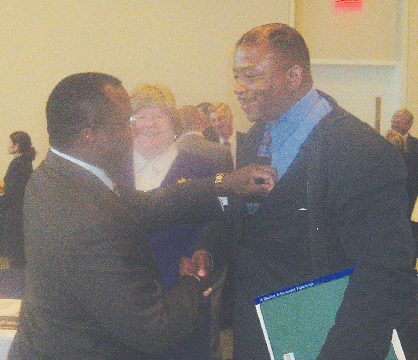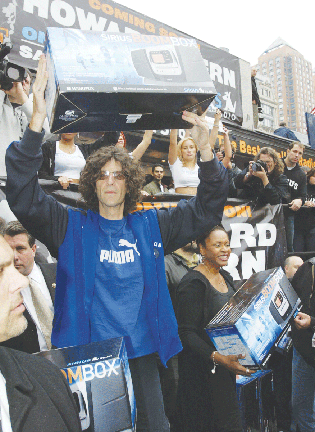Wilson Pushes For UMass Law School

Interim Chancellor Keith Motley and Trustee Karl White talk before the UMass Board of Trustees meets to discuss the controversial issue of creating a public law school.
November 19, 2004
UMass President Jack M. Wilson and other university system officials made a hard push last week in support of a proposal to create the state’s first public law school as trustees convened on the Boston campus.
“At this point I think the case has been made on the academic and financial front,” Wilson told trustees.
Wilson and supporters brought heavy artillery to the meeting, distributing copies of a letter of “enthusiastic” backing from former Gov. William Weld, presenting three young students from the Southern New England School of Law, and having two state legislators speak in support.
“It’s a home run,” said state Rep. John F. Quinn (D-Dartmouth), who joined state Senator Joan Menard (D-Somerset) at the podium.
A vote on the merger is expected by the end of the year, which was downplayed by UMass trustee chairman James Karam, a Dartmouth alumnus. Discussions will continue within the Board of Trustees, the legislature and Gov. Mitt Romney, he said.
“At the appropriate time, when we think we have all the questions answered, and provided the information everybody’s asked for, we’ll bring it forward,” he said. “I do expect to bring it in due course. I sense a tremendous amount of support on the board, and I want to follow through with that.”
The controversial proposal calls for UMass Dartmouth to merge with SNESL, a campus of 5.6 acres said to be worth $9.7 million, with $2.5 million in continuing debt and $1.5 million in a rainy day fund, which UMD Chancellor Jean MacCormack said would only be used if there was a “cataclysmic” drop in enrollment, but none to get accreditation from the American Bar Association. The law school currently has over 200 students with capacity for another 300, and has flunked accreditation twice.
MacCormack, said the main reason was for its failure to pass accreditation was due to financial status, but that 90 percent of ABA standards have been met, though the bar pass rate and LSAT scores need to be upped. It will cost about $900,000 to get accredited, she said, which would include hiring faculty and improving the library. Wilson said no funds would be diverted from UMD, and the law school would be brought in under Continuing Education Act. University officials maintain that no money would have to come from the state, either.
“Unlike three years ago, I think we’re both in better shape,” MacCormack, a former UMB vice chancellor of finance, said of the two schools, which had tried to merge nearly three years ago but couldn’t due to financial concerns, adding, “We will have a curriculum that will help people pass the bar.”
The law school which will focus on immigration, public service, and maritime law, and offer internships at immigration law clinics, and speakers from environmental law. Tuition is expected to stay at $19,000 a year, she said.
“It shows a slow but steadily improving picture financially,” university system treasurer Stephen Lenhardt said.
“I think it’s a great opportunity for the state, I think it’s a great opportunity for the UMass system,” said Karam.
Critics, many of them from the area’s private law schools, with Suffolk University and New England School of Law leading the charge, assert the numbers don’t add up.
Trustee and attorney Lawrence Boyle, a Suffolk alumnus and the lone member of the board last year to publicly demand for former UMass President William Bulger’s resignation, has emerged as a chief critic of the merger.
“What’s the big hurry?” he asked, noting that SNESL is up for accreditation again in 2006.
Boyle, who said he was upset with how the proposal was being handled, blasted the attempt to create a law school as a “power play to sell this Florida swampland,” and a “full-scale sales job.”
Boyle said energies should instead be directed at turning out what the state truly needs: nurses and biotechnology workers, and lowering university fees to save money for parents.
Other university trustees say they would like to see more information. Robert Sheridan, president of Savings Bank Life Insurance, said more work needs to be done on the “true cost” of accreditation, and is looking for an evaluation by an independent third party. “I’m keeping an open mind,” he said.
Trustee John DiBiaggio, who is said to be widely respected by other trustees due to past presidencies at Tufts and the University of Connecticut, and courted by Wilson for support for the proposal, said he had concerns about LSAT scores and performance on the bar exam. “Those issues have to be paramount,” he said.
“This is a presentation I’ve seen before,” said UMass Boston student trustee Tuan Pham, noting that it was important for trustees to see SNESL’s audited financial statements. “I can’t say I 100 percent support it until I see those papers.”
At the meeting MacCormack said that if the papers were handed over to UMass, they’d become public record, and the law school does not want the privates seeing their books. Trustees were invited to go down to Dartmouth to see the papers.
The merger could potentially impact UMass Boston, which came close to having its own law school with the New England School of Law eight to 10 years ago, according to current and former UMB senior administration officials. Plans were scrapped in fear of fierce opposition from Suffolk.
The current proposal has been greeted warmly by several faculty in the campus community.
“The Commonwealth deserves a law school,” said Edmund Beard, dean of the McCormack Graduate School for Policy Studies, which could see joint degree programs with the potential new law school. “I think it’s clearly good for UMass Boston.”
Beard was at the trustees’ meeting with Joseph McDonough, executive director of the Massachusetts Judges Association. The both of them, along with Rep. Quinn, a UMD alumnus who has taken part in the McCormack School’s Public Policy Program, had returned from a trip to Macedonia on rule of law reform. Having a law school will strengthen the partnership between UMass and other countries that are working with the university and the program on legal issues, Beard said.
The proposal has Interim Chancellor Keith Motley’s backing as well. “I support any opportunity to provide more access to our students,” he said after the meeting.






















































